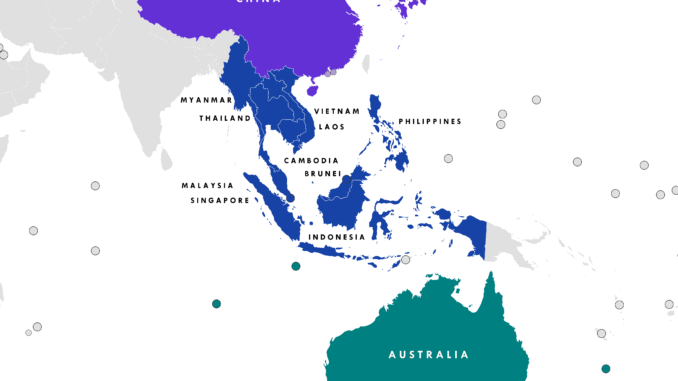
The Regional Comprehensive Economic Partnership (RCEP) Agreement is the most ambitious free trade agreement initiated by the members of the Association of Southeast Asian Nations (ASEAN), contributing to enhancing ASEAN centrality in regional frameworks and strengthening ASEAN cooperation with regional partners. It will be the world’s most significant trade pact, accounting for nearly 30 percent of global GDP and almost one-third of the world population. It is expected to positively impact the well-being of the people in the region and provide opportunities for businesses and economic activities among 15 Asia-Pacific countries. At the same time, there are potential negative impacts on the environment and resources and the lives and livelihoods of the people. These impacts will affect the implementation and achievement of sustainable development goals (SDGs). Therefore, while implementing the Agreement, the signatories should prioritized on certain SDGs to minimize the impacts to the environment, resources, and livelihoods of the people in the region and move towards the sustainable development pathway.
Although environment and climate related SDGs such as SDG 13 on climate action, SDG 14 on life below water, and SDG 15 on life on land are important to be prioritized, the countries should prioritize on the following three SDGs not only to minimize the negative impacts of implementing the Agreement but also to maximize the positive impacts on the countries in the region. These SDGs are: SDG 1 on poverty eradication; SDG 9 on industry, innovation and infrastructure, and SDG 12 on responsible consumption and production. These three areas of SDGs are in line with priorities areas of ASEAN countries in achieving ASEAN Community Vision 2025 and the 2030 Agenda for Sustainable, according to the complementarities report named “Complementarities between the ASEAN Community Vision 2025 and the United Nations 2030 Agenda for Sustainable Development”. These three priority areas of poverty eradication, infrastructure and connectivity, and sustainable consumption and production are also included in the “Complementarities Roadmap (2020-2025)”.
Poverty is reduced by boosting international trade. Global trade expands the number of quality jobs and encourages economic growth. At the same time, reduction of poverty can equate the increased number of consumers to reap the benefits of the international trade and economic growth. It is reciprocal benefits for the implementation of Agreement and the SDGs. In particular, one of the targets, target1.4 of SDG 1 is to “ensure that all men and women, in particular the poor and the vulnerable, have equal rights to economic resources, as well as access to basic services, ownership and control over land and other forms of property, inheritance, natural resources, appropriate new technology and financial services, including microfinance.”
Building resilient infrastructure and promoting sustainable industrialization and fostering innovation are main objectives of SDG 9. The complementarities report shows that major improvements in transport infrastructure, communication and the provision of modern energy, water and sanitation will need to occur over the coming decades to further improve the economic competitiveness, live ability and human capital and health in the ASEAN region. Most targets under the SDG 9 are important foundation for the success of RCEP. Some of these includes developing quality, reliable, sustainable and resilient infrastructure; increasing the access of small-scale industrial and other enterprises; and enhancing scientific research, upgrade the technological capabilities of industrial sectors, among others.
The analysis in the complementarities report also shows that the outlook for material footprint of government and household consumption and capital investment in the ASEAN region until 2030 suggests a strong increase in all aspects of consumption and additional growth in emissions. These will go hand in hand with the ongoing industrial and urban transition in the region. Responsible consumption and production under SDG 12 would make it possible to align economic growth with environmental and social objectives and would place the ASEAN region in a globally competitive position comparable to other RCEP countries such as Australia, China, Japan, and the Republic of Korea which are all investing in policies that support resource productivity and decoupling in major areas of high resource use including housing, mobility, food, energy and heavy industry.
Relevant documents
Image source: WikiPedia